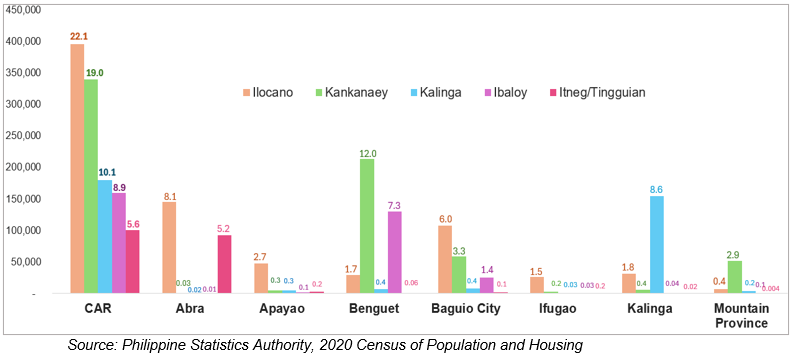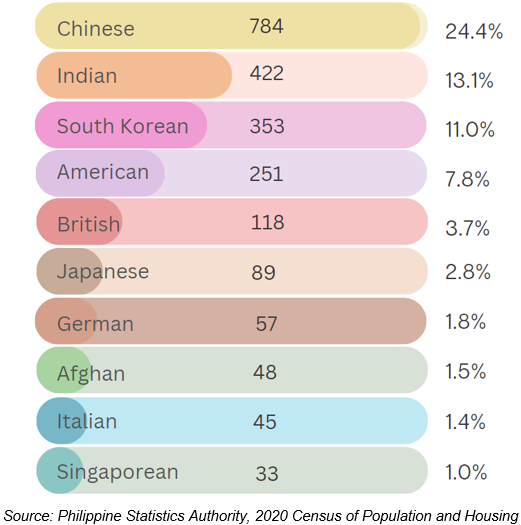1 in 5 five household population is of Ilocano ethnicity
In 2020, about 22.1% of the 1,791,121 household population in the Cordillera Administrative Region (CAR) reported Ilocano as their ethnicity.
Other major ethnicities in CAR in 2020 were Kankanaey (19.0%), Kalinga (10.1%), Ibaloy (8.9%), Itneg/Tinguian (5.6%), Tuwali (4.3%), Ayangan (3.9%), Tagalog (3.5%), Applai (3.1%), Kalanguya (2.8%), and Bontok (2.5%) (Figure 1).
Figure 1. Top Ten Ethnicities in the Cordillera Administrative Region (CAR): 2020

Most common ethnicity is Ilocano
In 2020, Ilocano was the most common ethnicity in the Cordillera region comprising 22.1% of the total household population in the region (Figure 2).
The Ilocanos were found mostly in Abra comprising 36.7% of the total Ilocano household population in the region (396,713), and 8.1% (145,492) of the 1,791,121 regional household population in CAR.
Out of 250,309 total provincial household population of Abra, the Ilocanos accounted for 58.1%. This translates to almost 3 Ilocanos for every 5 persons in a household in Abra in 2020. The City of Baguio followed with the most number of Ilocano household population in CAR with 27.2% (108,062). This means that about 3 in every 10 households in Baguio City were of Ilocano ethnicity in 2020.
Meanwhile, the province of Apayao had 2.7% (47,547), Kalinga had 1.8% (31,812) and Ifugao had 1.8% (31,812) Ilocano household population. Mountain Province had the least Ilocano household population with 0.4% (7,163).
Figure 2. Top Five Ethnicities by Province, CAR: 2020

Kankanaey was the second major ethnic group in CAR in 2020 comprising 19.0% of the total regional household population. The Kankanaeys were located mostly in the province of Benguet with 12.0%, Baguio City with 3.3%, and Mountain Province with 2.9% of the Kankanaey household population.
The province of Benguet had the highest number of Kankanaey household population among CAR provinces (12.0%) in 2020. Further, almost half of the household population in Benguet (46.6%) were of Kankanaey ethnicity.
The Kalinga ethnic group ranked third with the highest number of household population in CAR (180,242) with 10.1% (Figure 2).
By province/city in CAR, the province of Kalinga had the highest number of Kalinga household population with 8.6% (154,917). Out of the total of 229,328 household population in the province of Kalinga, almost seven (7) in ten (10) households or 67.5% were of Kalinga ethnicity in 2020.
Baguio City (7,793) and Benguet (7,359) both with 0.4% ranked second with the highest number of Kalinga household population. Meanwhile, the province of Apayao ranked third with 0.3% (5,179).
The Ibaloys comprised 8.9% (159,890) of the total household population in CAR (1,791,121) in 2020. Most of the Ibaloys were located in Benguet with 7.3 % (130,134).
The Itnegs/Tingguians accounted for 5.6% (100,806) of the total regional household population. The province of Abra had the most number of Itneg/Tingguian household with 92.2% (92,977) out of the total 100,806 Itneg/Tingguian household population in the region, followed by Apayao with 0.2% (2,811), and Baguio City with 0.1% (2,244).
1 in every 5 household population with foreign ethnicity are Chinese
Of the 1,791.121 million household population in the Cordillera region in 2020, 3,217 persons or 18.0% percent were of foreign ethnicity.
The Chinese dominated the household population with foreign ethnicity in the region (24.4%) (Figure 3).
The top 10 foreign ethnicities in CAR in 2020 accounted for 2,200 or 68.4% of the household population with foreign ethnicity. The Chinese ranked first with 784 persons (24.4%). This was followed by those with Indian ethnicity with 422 persons (13.1%), South Korean with 353 persons (11.0%), American with 251 persons (7.8%), British with 118 persons (3.7%), Japanese with 89 persons (2.8%), German with 57 persons (1.8%), Afghan with 48 persons (1.5%), Italian with 45 persons (1.4%), and Singaporean with 33 persons (1.0%) (Figure 3).
Australian, Canadian, French, Indonesian, North Korean, South African, Swiss, Taiwanese, and Turkish were also accounted as among the foreign household population in CAR in 2020. Other foreign ethnicity accounted for 26.4% or 856 persons.
By residence of the household population with foreign ethnicity, Baguio City ranked first with 2,399 foreigners (74.1%), followed by Benguet with 380 persons (12.0%), and Abra with 186 persons (5.6%).
The rest of the household population with foreign ethnicity were in Kalinga with 93 persons (2.9%), Ifugao with 74 persons (2.3%), Apayao with 53 persons (1.6%), and Mountain Province with 42 persons (1.3%).
Figure 3. Top Ten Foreign Ethnicities, CAR: 2020

(SGD)
JUANITO Y. YABES
Officer-In-Charge
(Chief Statistical Specialist, CRASD)
AFRB/RJPA/JRB
Technical Notes
Household is a social unit consisting of a person or a group of persons who sleep in the same housing unit and have a common arrangement in the preparation and consumption of food.
Household population refers to all persons who are members of the household.
Ethnicity is a primary sense of belonging to an ethnic group based on descent/blood relation/consanguinity. Ethnic group is consanguineous in nature, meaning, the ties are reckoned by blood and traced through the family tree. Thus, ethnicity refers to the household member’s identity, by descent/blood relation/consanguinity and not by mere choice nor by
adoption or confirmation by any ethnic group primarily the Indigenous Peoples (IPs).
Generally, ethnic grouping denotes genealogical and paternal lineage to any of the Philippines' group of native population. However, for the purpose of census, ethnic grouping also includes maternal lineage. As such, anybody whose consanguinity with either both parents or any one of them who is a member of an IP group, is an Indigenous Person.
The updated categories of ethnicity are provided by the National Commission on Indigenous Peoples and the National Commission on Muslim Filipinos.
In the 2020 CPH, data on the ethnicity of all household members were collected by asking the respondent, “What is _____'s ethnicity by descent/blood relation/consanguinity?”.

